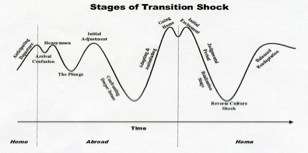December 12th, 2013

International students coming to the U.S. are bound to experience different degrees of culture shock but they are just as likely to experience reverse culture shock, or re-entry, when they return to their home countries during semester breaks and holidays. Reverse culture shock is an emotional and psychological stage of re-adjustment, to some degree similar to the adjustments the international student initially experiences when living abroad and away from family and friends. The symptoms for reverse culture shock may range from feeling disconnected from family and friends because the person retruning feels misunderstood and is afraid of losing the new aspects of him/herself.
It is an emotional and psychological stage of re-adjustment, similar to your initial adjustment to living abroad. Symptoms can range from feeling like no one understands you or how you’ve changed to feeling panicked that you will lose part of your identity if you don’t have an outlet to pursue new interests that were sparked abroad. Some of the common signs of reverse culture shock are:
• Confusion
• Restlessness
• Boredom
• Uncertainty
• Rootlessness
• Isolation
• Feeling homesick for college and friends made abroad
• Wanting to be alone
• Depression

How to cope with reverse culture shock?
Adjusting to the rhythms of life at home requires much of the same coping skills you had relied on as a student in your host country.
1. Sleep
Arriving to your home country brings with it jet lag and depending on how far away your home is from the host country, the more intense the jet lag. Be kind to yourself and get as much sleep as you can and don’t forget to stay hydrated and don’t skip on meals.
2. Stay Active
When not asleep, stay active, engage in exercise. Strenuous physical activity will help realign the balance between your sleep and awakened state and a speedier way of getting over jet lag.
3. Suspend Judgment
Behave as you did when you first arrived in your host country. Suspend judgment and criticism of your family and friends. Avoid making comparisons of how things are better where you went to college. Friends and family will be interested in your experiences and will ask questions which you may hear more than once. Assume the role of ambassador by responding and sharing your experiences that is inclusive and engaging. Don’t showboat or brag, A little humility at the onset goes a long way.
4. Readjust to Changing Relationships
Just because you left and feel like you have changed doesn’t mean that those friends and family members back home stopped having experiences of their own. You may find that you may have outgrown some childhood friendships and vice versa. Be prepared to adjust to this change.
5. Stay in touch
Don’t forget your friends from college. Stay in touch and keep your friendships alive even though you may be separated by thousands of miles. Luckily, today’s assortment of communication technologies from Twitter, Facebook, Skype, email, make it possible for us to stay connected wherever we live. But don’t overdo it! Enjoy your time in your home country and get involved so that you have stories to tell and experiences to share when you return to college the following semester.
And remember to keep a sense of humor throughout it all and know that the initial unease of reverse culture shock will soon wear away. The more you practice the exercise of adjusting and adapting to your two “homes,” the easier it will be for you to apply the same techniques wherever you choose to travel and live after you graduate.

Academic Credentials Evaluation Institute, Inc.
www.acei1.com


